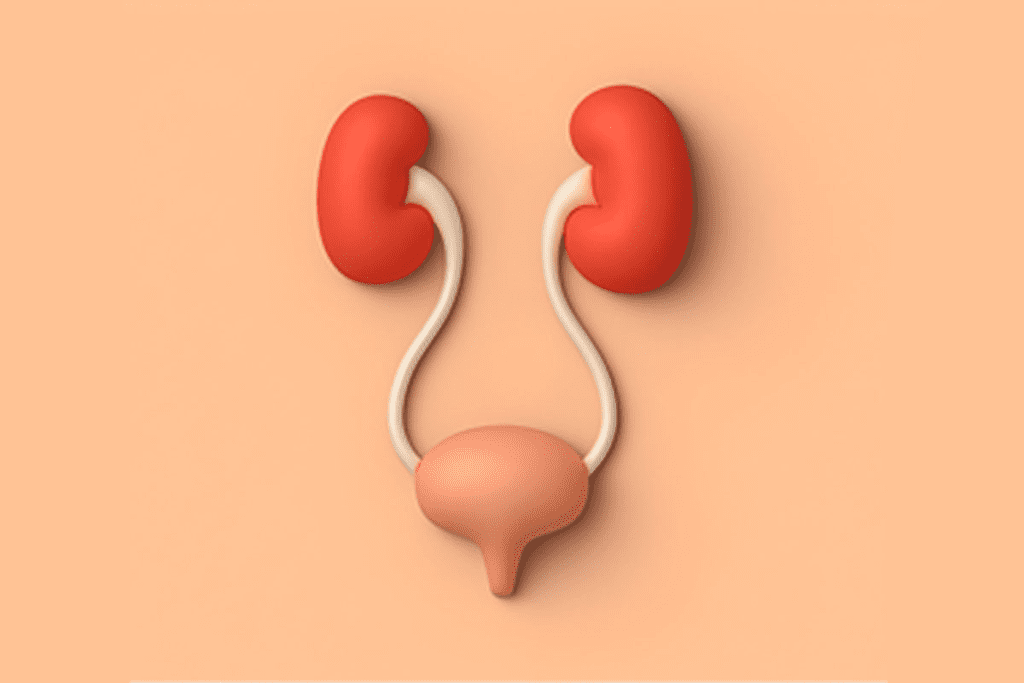Urinary issues like retention and incontinence affect millions globally. Studies show a high rate of drug-induced urinary retention related to urinary retention meds. Between 2004 and Q1 2024, over 16,000 cases were reported, highlighting the significant impact of medications on urinary health.

Some medications can harm bladder health, leading to retention or incontinence. Healthcare providers must watch for these side effects in patients on many drugs.
Knowing which drugs cause these problems is vital. It helps prevent, diagnose, and treat issues quickly. This is critical in hospitals focused on quality care and safety.
Key Takeaways
- Certain medications can cause urinary retention or incontinence.
- Over 16,000 drug-induced urinary retention cases were reported between 2004 and Q1 2024.
- Commonly prescribed drugs are often the culprit behind urinary issues.
- Vigilance is necessary when managing patients on multiple medications.
- Understanding the medications that cause urinary problems is key to prevention and effective treatment.
Understanding Medication-Induced Urinary Problems
It’s important to know how medicines affect our urinary health. This knowledge helps doctors take better care of their patients. Medicines can cause urinary problems, which can really affect a person’s life.
Types of Urinary Symptoms Caused by Medications
Many medicines can lead to urinary retention, incontinence, and frequency. These issues can be very upsetting and make everyday tasks hard. For example, some anticholinergic medications relax the bladder muscle, causing retention. On the other hand, diuretics can make you need to go to the bathroom more often.
Medicines like antipsychotics, antidepressants, and some urological drugs can also cause urinary problems. Doctors need to know about these side effects to help their patients better.

Pharmacovigilance Data: 16,000+ Cases https://www.example.com
Pharmacovigilance data show over 16,000 cases of urinary problems caused by medicines. This has happened from 2004 to now. The symptoms often start 29 days after starting the medicine.
Looking at these numbers helps us understand how common and serious these problems are. It helps doctors and nurses give better care and find ways to manage these issues.
Demographics: Why Men Over 65 Are at Higher Risk
Most cases, 54%, were in men over 65. This age group is more likely to have urinary retention problems. This is because their bladder muscles get weaker with age and they might also have prostate issues.
Knowing this helps doctors spot who is at risk. They can then plan treatments that are more likely to work for these patients.
Psychiatric Medications and Urinary Retention Meds
Psychiatric meds, like those with anticholinergic properties, can affect bladder function. We’ll look at how certain meds, including antipsychotics and antidepressants, can cause urinary retention or other issues.
Antipsychotics: Quetiapine and Related Medications
Antipsychotics, like quetiapine, are used for schizophrenia and bipolar disorder. But, they can lead to urinary retention because of their anticholinergic effects. It’s important to think about urinary side effects when using these meds, mainly in older adults.
Quetiapine, in particular, can cause urinary hesitation and retention in some. Healthcare providers should watch for these side effects and adjust treatment plans as needed.
Antidepressants: Fluoxetine and SSRIs
SSRIs, such as fluoxetine, are used for depression and anxiety. While they’re usually safe, they can cause urinary problems in some. The anticholinergic effects of certain antidepressants can lead to urinary retention.
Healthcare providers need to know about the urinary side effects of antidepressants. They should talk to their patients about these risks. If urinary problems occur, other treatment options might be needed.
Anticholinergic Effects on Bladder Function
The anticholinergic effects of psychiatric meds can harm bladder function. These effects happen when meds block acetylcholine, a neurotransmitter important for bladder contraction and urination.
It’s key to understand the anticholinergic effects of psychiatric meds for managing urinary retention and other issues. By recognizing these effects, healthcare providers can make better treatment choices and reduce urinary complications.

Urological and Bladder Medications
Urological and bladder medications help with urinary symptoms. But, they can have more than one effect. We’ll look at how antimuscarinics and beta-3 adrenergic agonists work. Sometimes, they can cause unexpected effects.
Antimuscarinics: Fesoterodine and Solifenacin
Antimuscarinics treat an overactive bladder. Drugs like fesoterodine and solifenacin relax the bladder muscle. This makes the bladder hold more and reduces the need to urinate. But, they can also cause dry mouth and constipation.
Some key points about antimuscarinics include:
- They are effective in reducing symptoms of overactive bladder.
- They can have anticholinergic side effects.
- Patient selection is key to avoid bad effects.
Beta-3 Adrenergic Agonists: Mirabegron
Beta-3 adrenergic agonists, like mirabegron, are an alternative to antimuscarinics. They relax the bladder muscle by activating beta-3 receptors. This type of medication has fewer side effects than antimuscarinics. But, it can raise blood pressure in some patients.
Key benefits of beta-3 adrenergic agonists include:
- Increased bladder capacity.
- Fewer anticholinergic side effects.
- Good for those who can’t take antimuscarinics.
Paradoxical Effects of Urinary Medications
Urological medications can sometimes have opposite effects. They might cause or make worse the symptoms they aim to fix. For example, some drugs can lead to urinary retention or increase the risk of urinary tract infections. It’s important for healthcare providers to know about these effects to manage patient care well.
To reduce these risks, we must:
- Pick patients carefully for certain medications.
- Watch for bad effects.
- Change treatment plans if needed.
Understanding the complex effects of urological and bladder medications helps us manage urinary conditions better. This improves patient outcomes.
Respiratory and Cardiovascular Medications
Medications for the lungs and heart are key for many health issues. Yet, they can also affect how we pee. These drugs help with lung and heart problems but can impact our urinary system too.
Bronchodilators: Tiotropium and Urinary Retention
Bronchodilators, like tiotropium, help with lung diseases like COPD and asthma. They work well but can sometimes cause trouble peeing. People taking these should watch for signs of trouble peeing, like hard starts or weak streams.
Calcium Channel Blockers: Amlodipine and Urination
Calcium channel blockers, like amlodipine, help with high blood pressure and chest pain. They can change how we pee, but not as much as bronchodilators. Some wonder: does amlodipine make you pee more? Amlodipine doesn’t usually make you pee more, but everyone is different.
Diuretics: Intended Effects vs. Adverse Reactions
Diuretics help by making more pee to fight high blood pressure and swelling. But, they can cause problems like leaking pee or needing to pee a lot at night. It’s important to manage diuretics well to avoid pee problems.
In short, meds for the lungs and heart can really affect how we pee. Doctors need to know this to help patients and avoid pee troubles.
- Bronchodilators can cause urinary retention due to anticholinergic effects.
- Calcium channel blockers may affect urination patterns, though effects are generally mild.
- Diuretics can lead to urinary incontinence or nocturia if not managed carefully.
Emerging Concerns: Cancer and Diabetes Medications
Medications for cancer and diabetes are becoming more common. This has led to more urinary problems. It’s important to understand how these treatments affect our bodies.
Antineoplastic Agents and Urinary Complications
Medicines like Abiraterone are used to fight cancer. But they can cause urinary issues. Abiraterone, in particular, may lead to more urinary tract infections.
It’s key to watch for urinary problems in patients taking these drugs. They might need extra care to avoid issues.
Antidiabetic Medications and Urinary Health
Empagliflozin and other SGLT2 inhibitors help manage diabetes. Yet, they can increase the risk of urinary tract infections. This is because they make the body excrete more glucose through urine.
- Increased risk of urinary tract infections
- Potential for urinary retention
- Importance of monitoring urinary health in diabetic patients on SGLT2 inhibitors
Annual Rise in Urinary Retention Cases
More cases of urinary retention are being seen each year. This is tied to the use of certain cancer and diabetes drugs. It’s vital for doctors to keep a close eye on patients for any signs of urinary issues.
“The increasing use of certain cancer and diabetes medications has significant implications for urinary health. Healthcare providers must be aware of these risks to provide appropriate care.”
Expert Opinion
It’s essential to know the risks these medications pose. This knowledge helps doctors manage patients better. By understanding these risks, doctors can help prevent urinary problems and improve patient care.
Conclusion: Managing Medication-Related Urinary Problems
Knowing which medications can cause urinary issues is key. At Liv Hospital, we focus on spotting these risks early. This helps us give our patients the best care possible. Medications like anticholinergics and opioid analgesics can harm the bladder, causing problems with urination.
Being aware of these side effects lets healthcare teams act fast. This way, we can manage urinary issues better. It’s all about staying alert and proactive in treating these problems.
Studies show that older adults face a high risk of drug side effects, with about 11.0% experiencing them. For more details on medication risks. Understanding the side effects of medications is essential for managing them well. This knowledge helps us improve patient care and reduce risks, leading to better health outcomes.
FAQ
What are the most common medications that cause urinary retention?
Medications that can cause urinary retention include antipsychotics, antidepressants, antimuscarinics, and certain cardiovascular medications like calcium channel blockers.
How do psychiatric medications affect urinary function?
Psychiatric medications, such as antipsychotics and antidepressants, can affect bladder function. This can lead to urinary retention or incontinence due to their anticholinergic effects.
Can urological medications paradoxically worsen urinary symptoms?
Yes, certain urological medications like antimuscarinics and beta-3 adrenergic agonists can have paradoxical effects. Sometimes, they can worsen urinary symptoms in some patients.
Do calcium channel blockers like amlodipine cause urinary problems?
Calcium channel blockers, including amlodipine, can potentially cause urinary problems. This includes urinary retention, but it’s less common.
Are men over 65 at a higher risk of medication-induced urinary retention?
Yes, men over 65 are at a higher risk of experiencing medication-induced urinary retention. This is due to age-related changes and the higher likelihood of being on multiple medications.
How do antineoplastic agents used in cancer treatment affect urinary function?
Certain antineoplastic agents, such as abiraterone, can lead to urinary complications. This includes urinary retention as a side effect of the treatment.
Can antidiabetic medications cause urinary problems?
Yes, certain antidiabetic medications, including SGLT2 inhibitors like empagliflozin, have been associated with urinary retention. They can also cause other urinary complications.
What should I do if I’m experiencing urinary problems while taking medications?
If you’re experiencing urinary problems while on medications, it’s important to consult your healthcare provider. They can assess the situation and potentially adjust your treatment regimen.
References
- Golnezhad, A., et al. (2010). Drug-Induced Urinary Retention: Incidence, Management, and Prevention. Drug Safety (review). Retrieved from https://link.springer.com/article/10.2165/00002018-200831050-00002


































